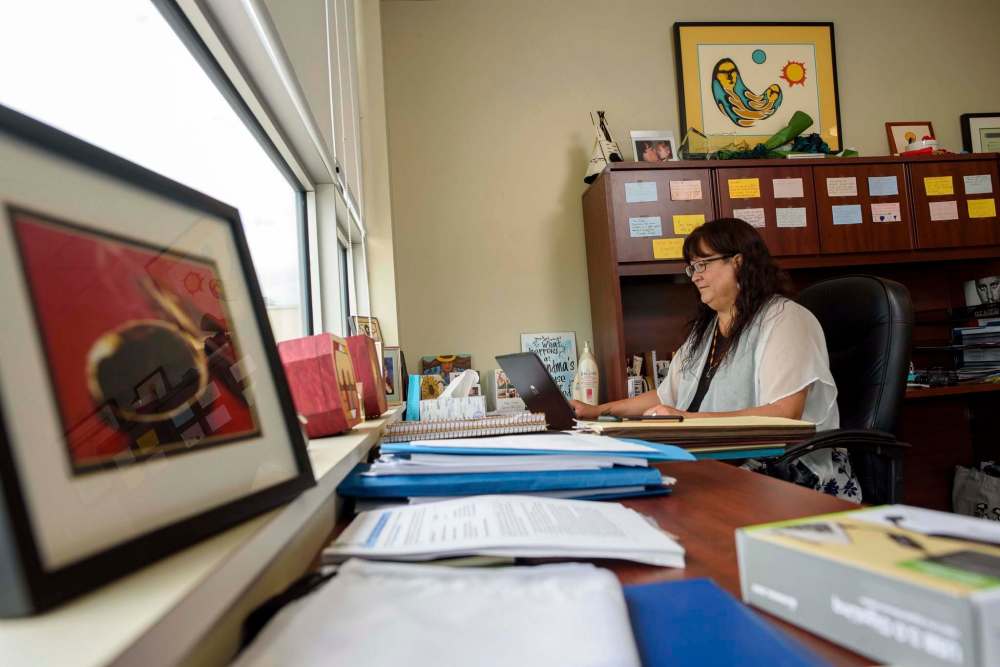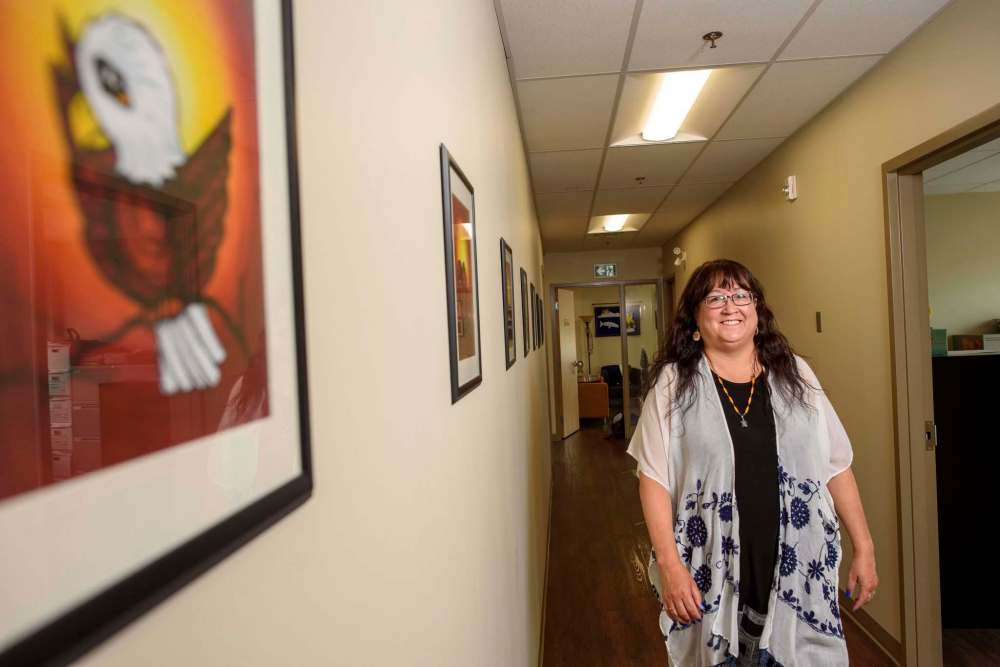Passion for positive change
Ma Mawi Wi Chi Itata executive director is a tireless advocate for the rights and protection of Indigenous women, children
Advertisement
Read this article for free:
or
Already have an account? Log in here »
To continue reading, please subscribe:
Monthly Digital Subscription
$1 per week for 24 weeks*
- Enjoy unlimited reading on winnipegfreepress.com
- Read the E-Edition, our digital replica newspaper
- Access News Break, our award-winning app
- Play interactive puzzles
*Billed as $4.00 plus GST every four weeks. After 24 weeks, price increases to the regular rate of $19.95 plus GST every four weeks. Offer available to new and qualified returning subscribers only. Cancel any time.
Monthly Digital Subscription
$4.99/week*
- Enjoy unlimited reading on winnipegfreepress.com
- Read the E-Edition, our digital replica newspaper
- Access News Break, our award-winning app
- Play interactive puzzles
*Billed as $19.95 plus GST every four weeks. Cancel any time.
To continue reading, please subscribe:
Add Free Press access to your Brandon Sun subscription for only an additional
$1 for the first 4 weeks*
*Your next subscription payment will increase by $1.00 and you will be charged $16.99 plus GST for four weeks. After four weeks, your payment will increase to $23.99 plus GST every four weeks.
Read unlimited articles for free today:
or
Already have an account? Log in here »
Hey there, time traveller!
This article was published 04/08/2020 (2009 days ago), so information in it may no longer be current.
Food was under lock and key at the home for teen moms where Diane Redsky lived for three months of her adolescence.
Redsky wasn’t expecting and she didn’t meet the criteria to live at the maternity home, run by the Salvation Army near Grace Hospital, but the child-welfare agency responsible for her well-being had run out of options, she says.
“That was the longest placement I had,” says Redsky, who currently serves as executive director of Ma Mawi Wi Chi Itata Centre in Winnipeg.

“I was one of those kids that was running away all the time… because it wasn’t my home and it wasn’t my family and you’re always the odd person out,” she recalls during a video call interview from the organization’s administrative office in Headingley. “It was that way and it felt that way.”
“Literally I would walk in one door and out the back door. I never really got to know foster parents,” she says. “I didn’t have a bad experience. It just wasn’t home.”
Now at the helm of Ma Mawi, a robust, Indigenous-led, family support service organization working with families and youth throughout Winnipeg and Manitoba, Redsky is a celebrated advocate awarded multiple times for her work to advance the rights of women and children.
Since 1997, Redsky, a member of Shoal Lake 40 First Nation, has been part of the fabric of Ma Mawi, and in her early years with the organization she founded the Aboriginal Head Start Little Red Spirit program and a home for teen moms called Isobel’s Place — where the pantry is always open. Both programs continue to operate today.
She stepped away from Ma Mawi for a period between 2010 and 2015 to lead the National Task Force on Sex Trafficking of Women and Girls in Canada, before returning as executive director.
Looking back on her nearly two years spent in care, beginning at the age of 13, Redsky remembers being isolated from family, bouncing between placements and couch-surfing. She recalls wondering whether she would eat that day and attending school to see friends who would share their lunches.
And she recalls the dimly lit basement where newborns and their mothers lived at the maternity home, separated from their expectant peers, and wondering how family could bond with the newborn in the closet-sized visiting room.
Redsky keeps her focus in the present, however.
“When I look back, everything happens for a reason,” she says. “Of all the things that I learned about being in child welfare… it’s developing programs that are doing just the opposite of that.”
Across the 50-plus programs administered by Ma Mawi at more than a dozen locations, the organization is focused on supporting women and children and rebuilding families ensnared by the child-welfare system, poverty, systemic discrimination, sexual exploitation and violence.
A typical day for Redsky sees her attending back-to-back meetings and often putting in 12-hour shifts, six days a week. Since the coronavirus pandemic hit Manitoba, demand for services at Ma Mawi have increased, Redsky says, and so has her workload.
“Everything shut down and it just heightened and maximized all of the gaps to where the systems were already failing people,” she says.
“And if anything, now, I hope the new normal is about addressing all of those gaps that are now magnified even more — that we’ve been advocating for many years but are magnified as a result of COVID — that poor people became poorer.”

Ma Mawi reached a milestone last year, facilitating the return of 350 children in the child-welfare system to relatives through its family group conferencing program, up from 50 children the year prior. The program is based in Indigenous knowledge and builds on the natural instincts of family, Redsky says, supporting relatives in an all-hands-on-deck approach to caring for children.
“Working for an organization like Ma Mawi has allowed us to do things based on our value system, based on making systems work for people that are strength-based and value-based, because systems are not set up to do that for us,” she says. “In fact, systems especially for Indigenous people are set up to make us fail.
“Much of my career has been changing those systems, to flip the script, so Indigenous people can succeed.”
Joy Smith, a former member of Parliament and anti-human trafficking advocate who has worked closely with Redsky for more than a decade, says her colleague is masterful at bringing about legislative change and illustrating for policy-makers how systems neglect the most vulnerable.
“In this business, there are very few who have the kind of experience and knowledge that Diane has, and this is what I respect,” Smith says. “She’s very focused, and she’s very survivor-oriented. So she works through the systems, she learns how to make things happen for the good.
“She can take the practical, everyday life and the needs of the survivor and she can address those needs, and then she can go to the legislature to actually fight for the issues that survivors need.”
And in the coming weeks, Redsky will turn her attention to addressing violence against Indigenous women, girls and LGBTTQ+ people as chair of the urban sub-working group for the Missing and Murdered Indigenous Women and Girls National Action Plan development, mandated in the Calls for Justice of the national inquiry.
“You solve inequity by changing the system,” she says. “I just feel so compelled to do something and I just can’t stop myself from not doing something about it and problem-solving in a good way.
“I’m not leading protests. I’m figuring out the system and building relationships and a network — gather up enough grassroots allies and then we can all do it together.”
danielle.dasilva@freepress.mb.ca

